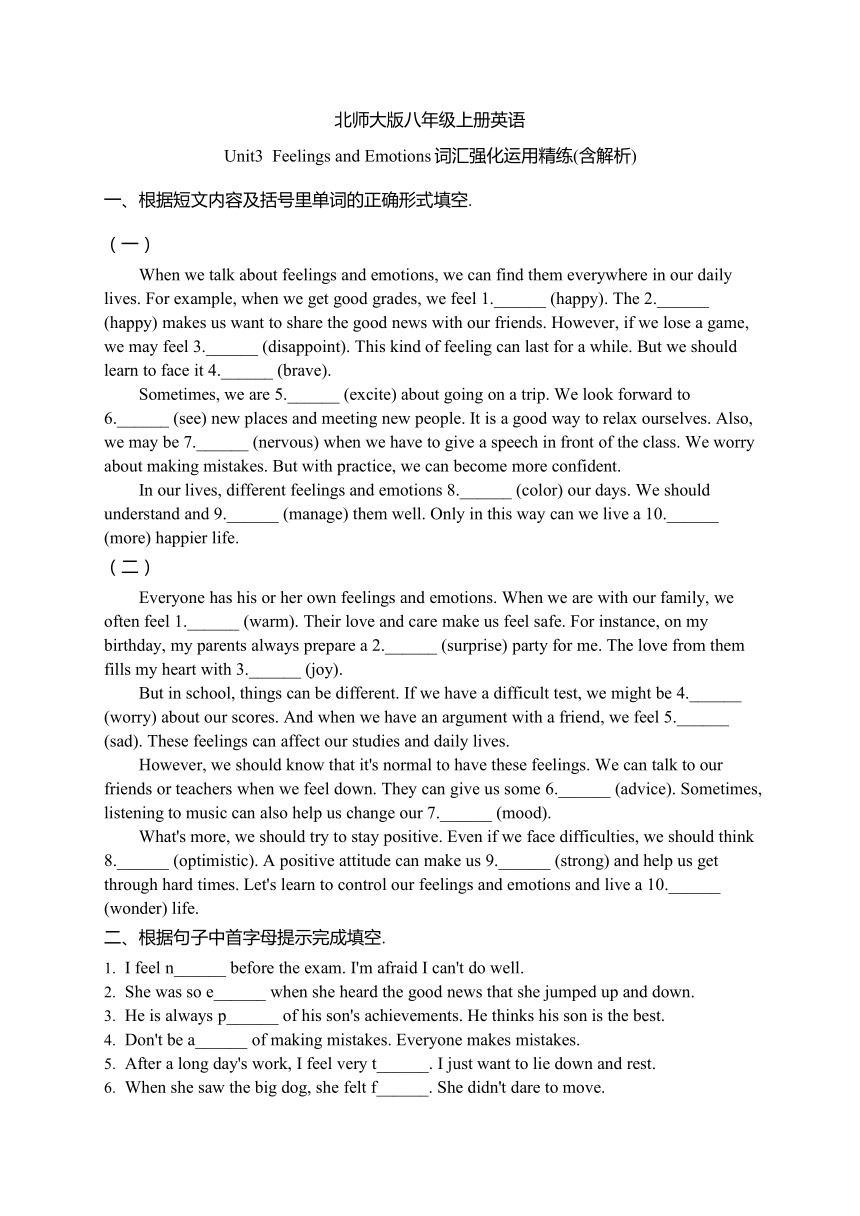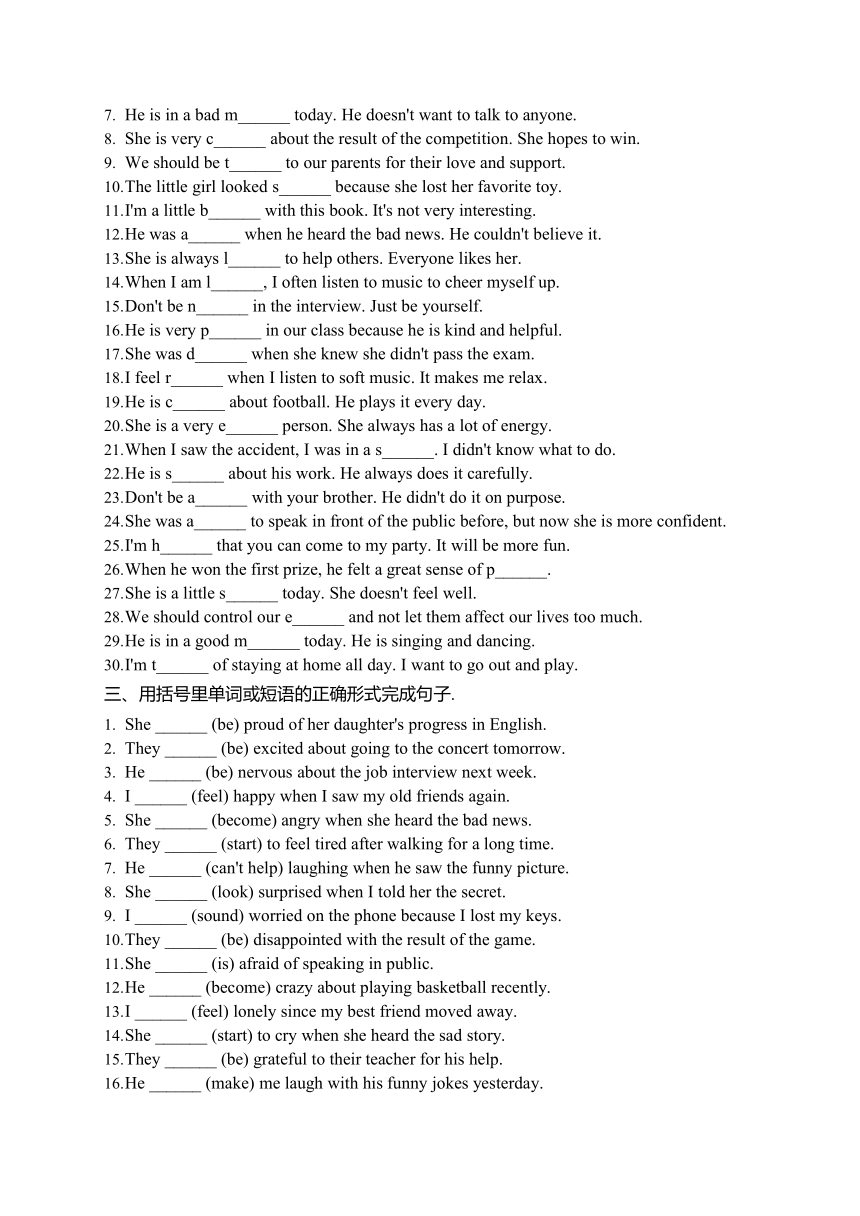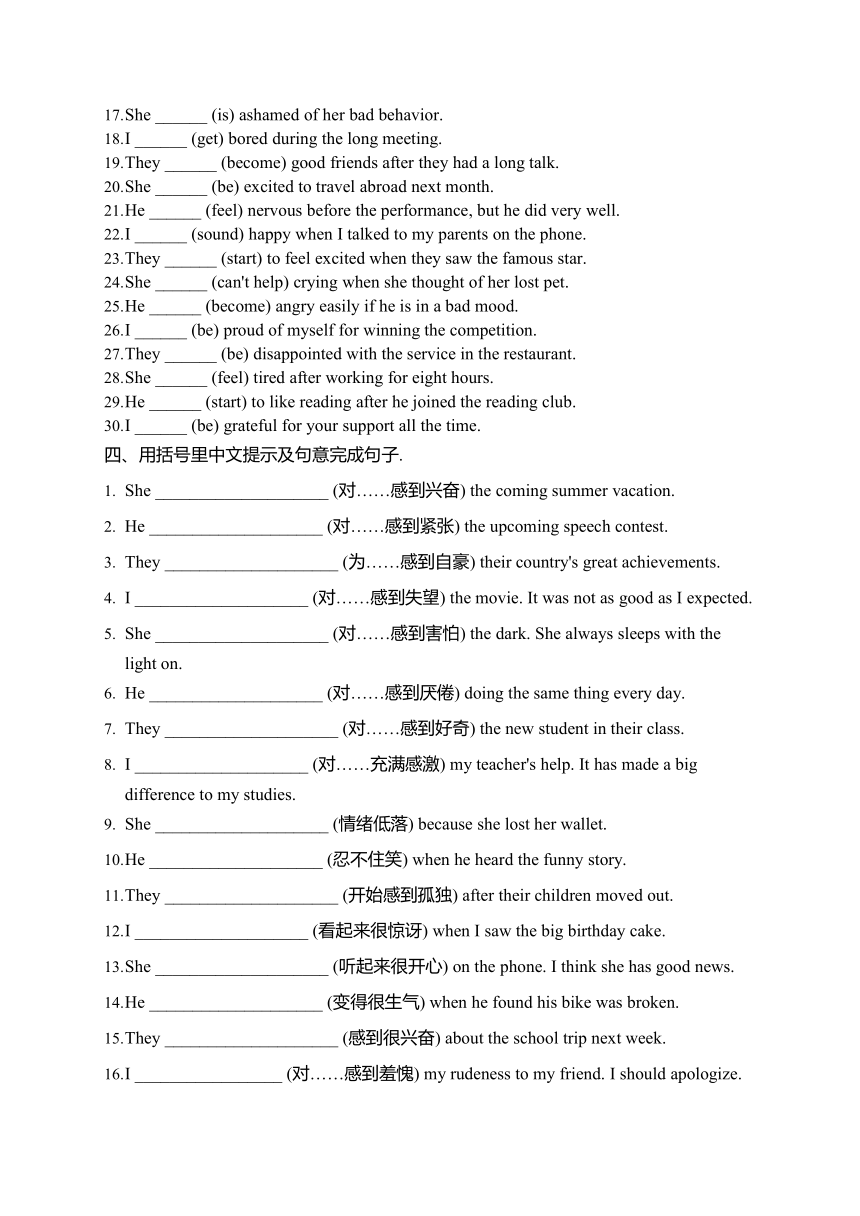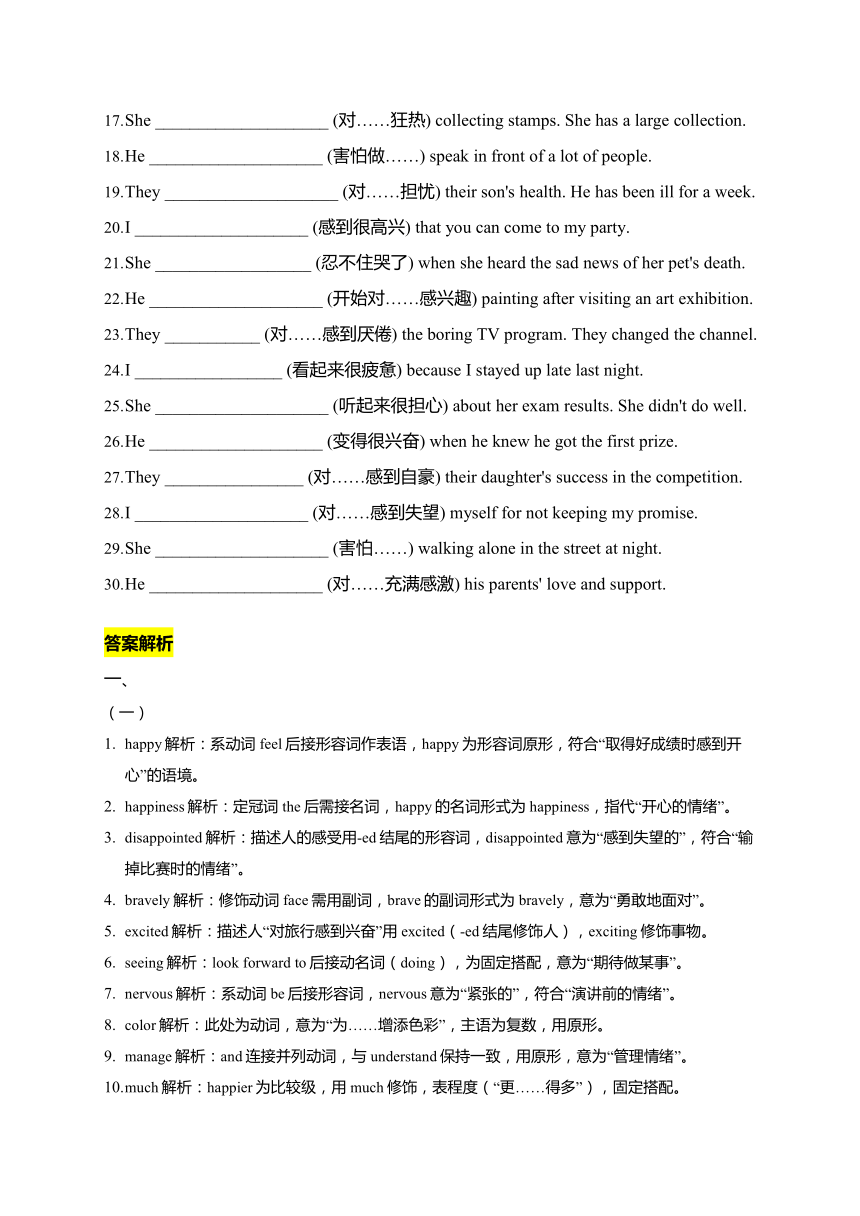北师大版(2024)八年级上册英语Unit3 Feelings and Emotions词汇强化运用精练(含解析)
文档属性
| 名称 | 北师大版(2024)八年级上册英语Unit3 Feelings and Emotions词汇强化运用精练(含解析) |  | |
| 格式 | docx | ||
| 文件大小 | 24.6KB | ||
| 资源类型 | 教案 | ||
| 版本资源 | 北师大版 | ||
| 科目 | 英语 | ||
| 更新时间 | 2025-08-18 22:29:31 | ||
图片预览




文档简介
北师大版八年级上册英语
Unit3 Feelings and Emotions词汇强化运用精练(含解析)
一、根据短文内容及括号里单词的正确形式填空.
(一)
When we talk about feelings and emotions, we can find them everywhere in our daily lives. For example, when we get good grades, we feel 1.______ (happy). The 2.______ (happy) makes us want to share the good news with our friends. However, if we lose a game, we may feel 3.______ (disappoint). This kind of feeling can last for a while. But we should learn to face it 4.______ (brave).
Sometimes, we are 5.______ (excite) about going on a trip. We look forward to 6.______ (see) new places and meeting new people. It is a good way to relax ourselves. Also, we may be 7.______ (nervous) when we have to give a speech in front of the class. We worry about making mistakes. But with practice, we can become more confident.
In our lives, different feelings and emotions 8.______ (color) our days. We should understand and 9.______ (manage) them well. Only in this way can we live a 10.______ (more) happier life.
(二)
Everyone has his or her own feelings and emotions. When we are with our family, we often feel 1.______ (warm). Their love and care make us feel safe. For instance, on my birthday, my parents always prepare a 2.______ (surprise) party for me. The love from them fills my heart with 3.______ (joy).
But in school, things can be different. If we have a difficult test, we might be 4.______ (worry) about our scores. And when we have an argument with a friend, we feel 5.______ (sad). These feelings can affect our studies and daily lives.
However, we should know that it's normal to have these feelings. We can talk to our friends or teachers when we feel down. They can give us some 6.______ (advice). Sometimes, listening to music can also help us change our 7.______ (mood).
What's more, we should try to stay positive. Even if we face difficulties, we should think 8.______ (optimistic). A positive attitude can make us 9.______ (strong) and help us get through hard times. Let's learn to control our feelings and emotions and live a 10.______ (wonder) life.
二、根据句子中首字母提示完成填空.
I feel n______ before the exam. I'm afraid I can't do well.
She was so e______ when she heard the good news that she jumped up and down.
He is always p______ of his son's achievements. He thinks his son is the best.
Don't be a______ of making mistakes. Everyone makes mistakes.
After a long day's work, I feel very t______. I just want to lie down and rest.
When she saw the big dog, she felt f______. She didn't dare to move.
He is in a bad m______ today. He doesn't want to talk to anyone.
She is very c______ about the result of the competition. She hopes to win.
We should be t______ to our parents for their love and support.
The little girl looked s______ because she lost her favorite toy.
I'm a little b______ with this book. It's not very interesting.
He was a______ when he heard the bad news. He couldn't believe it.
She is always l______ to help others. Everyone likes her.
When I am l______, I often listen to music to cheer myself up.
Don't be n______ in the interview. Just be yourself.
He is very p______ in our class because he is kind and helpful.
She was d______ when she knew she didn't pass the exam.
I feel r______ when I listen to soft music. It makes me relax.
He is c______ about football. He plays it every day.
She is a very e______ person. She always has a lot of energy.
When I saw the accident, I was in a s______. I didn't know what to do.
He is s______ about his work. He always does it carefully.
Don't be a______ with your brother. He didn't do it on purpose.
She was a______ to speak in front of the public before, but now she is more confident.
I'm h______ that you can come to my party. It will be more fun.
When he won the first prize, he felt a great sense of p______.
She is a little s______ today. She doesn't feel well.
We should control our e______ and not let them affect our lives too much.
He is in a good m______ today. He is singing and dancing.
I'm t______ of staying at home all day. I want to go out and play.
三、用括号里单词或短语的正确形式完成句子.
She ______ (be) proud of her daughter's progress in English.
They ______ (be) excited about going to the concert tomorrow.
He ______ (be) nervous about the job interview next week.
I ______ (feel) happy when I saw my old friends again.
She ______ (become) angry when she heard the bad news.
They ______ (start) to feel tired after walking for a long time.
He ______ (can't help) laughing when he saw the funny picture.
She ______ (look) surprised when I told her the secret.
I ______ (sound) worried on the phone because I lost my keys.
They ______ (be) disappointed with the result of the game.
She ______ (is) afraid of speaking in public.
He ______ (become) crazy about playing basketball recently.
I ______ (feel) lonely since my best friend moved away.
She ______ (start) to cry when she heard the sad story.
They ______ (be) grateful to their teacher for his help.
He ______ (make) me laugh with his funny jokes yesterday.
She ______ (is) ashamed of her bad behavior.
I ______ (get) bored during the long meeting.
They ______ (become) good friends after they had a long talk.
She ______ (be) excited to travel abroad next month.
He ______ (feel) nervous before the performance, but he did very well.
I ______ (sound) happy when I talked to my parents on the phone.
They ______ (start) to feel excited when they saw the famous star.
She ______ (can't help) crying when she thought of her lost pet.
He ______ (become) angry easily if he is in a bad mood.
I ______ (be) proud of myself for winning the competition.
They ______ (be) disappointed with the service in the restaurant.
She ______ (feel) tired after working for eight hours.
He ______ (start) to like reading after he joined the reading club.
I ______ (be) grateful for your support all the time.
四、用括号里中文提示及句意完成句子.
She ____________________ (对……感到兴奋) the coming summer vacation.
He ____________________ (对……感到紧张) the upcoming speech contest.
They ____________________ (为……感到自豪) their country's great achievements.
I ____________________ (对……感到失望) the movie. It was not as good as I expected.
She ____________________ (对……感到害怕) the dark. She always sleeps with the light on.
He ____________________ (对……感到厌倦) doing the same thing every day.
They ____________________ (对……感到好奇) the new student in their class.
I ____________________ (对……充满感激) my teacher's help. It has made a big difference to my studies.
She ____________________ (情绪低落) because she lost her wallet.
He ____________________ (忍不住笑) when he heard the funny story.
They ____________________ (开始感到孤独) after their children moved out.
I ____________________ (看起来很惊讶) when I saw the big birthday cake.
She ____________________ (听起来很开心) on the phone. I think she has good news.
He ____________________ (变得很生气) when he found his bike was broken.
They ____________________ (感到很兴奋) about the school trip next week.
I _________________ (对……感到羞愧) my rudeness to my friend. I should apologize.
She ____________________ (对……狂热) collecting stamps. She has a large collection.
He ____________________ (害怕做……) speak in front of a lot of people.
They ____________________ (对……担忧) their son's health. He has been ill for a week.
I ____________________ (感到很高兴) that you can come to my party.
She __________________ (忍不住哭了) when she heard the sad news of her pet's death.
He ____________________ (开始对……感兴趣) painting after visiting an art exhibition.
They ___________ (对……感到厌倦) the boring TV program. They changed the channel.
I _________________ (看起来很疲惫) because I stayed up late last night.
She ____________________ (听起来很担心) about her exam results. She didn't do well.
He ____________________ (变得很兴奋) when he knew he got the first prize.
They ________________ (对……感到自豪) their daughter's success in the competition.
I ____________________ (对……感到失望) myself for not keeping my promise.
She ____________________ (害怕……) walking alone in the street at night.
He ____________________ (对……充满感激) his parents' love and support.
答案解析
(一)
happy解析:系动词feel后接形容词作表语,happy为形容词原形,符合“取得好成绩时感到开心”的语境。
happiness解析:定冠词the后需接名词,happy的名词形式为happiness,指代“开心的情绪”。
disappointed解析:描述人的感受用-ed结尾的形容词,disappointed意为“感到失望的”,符合“输掉比赛时的情绪”。
bravely解析:修饰动词face需用副词,brave的副词形式为bravely,意为“勇敢地面对”。
excited解析:描述人“对旅行感到兴奋”用excited(-ed结尾修饰人),exciting修饰事物。
seeing解析:look forward to后接动名词(doing),为固定搭配,意为“期待做某事”。
nervous解析:系动词be后接形容词,nervous意为“紧张的”,符合“演讲前的情绪”。
color解析:此处为动词,意为“为……增添色彩”,主语为复数,用原形。
manage解析:and连接并列动词,与understand保持一致,用原形,意为“管理情绪”。
much解析:happier为比较级,用much修饰,表程度(“更……得多”),固定搭配。
(二)
warm解析:系动词feel后接形容词,warm意为“温暖的”,符合“和家人在一起的感受”。
surprising解析:修饰名词party用-ing结尾的形容词,surprising意为“令人惊喜的”,描述事物特征。
joy解析:介词with后接名词,joy为不可数名词,意为“喜悦”。
worried解析:be worried about为固定搭配,意为“为……担忧”,描述人的感受。
sad解析:系动词feel后接形容词,sad意为“难过的”,符合“和朋友吵架后的情绪”。
advice解析:some后接不可数名词或可数名词复数,advice为不可数名词,意为“建议”。
moods解析:mood为可数名词,此处表泛指“情绪”,用复数形式moods。
optimistically解析:修饰动词think需用副词,optimistic的副词形式为optimistically,意为“乐观地思考”。
stronger解析:根据语境“积极态度让我们更强大”,用strong的比较级stronger。
wonderful解析:修饰名词life用形容词,wonderful意为“美好的”,符合句意。
二、根据句子中首字母提示完成填空。
nervous(紧张的)解析:考试前的常见情绪,be nervous before exams为固定语境。
excited(兴奋的)解析:听到好消息时的反应,“跳起来”暗示兴奋。
proud(自豪的)解析:be proud of为固定搭配,意为“为……自豪”,符合“认为儿子是最好的”语境。
afraid(害怕的)解析:be afraid of为固定搭配,意为“害怕……”,符合“每个人都会犯错”的劝诫。
tired(疲惫的)解析:工作一天后的感受,“只想躺下休息”暗示疲惫。
frightened(害怕的)解析:看到大狗时的反应,“不敢动”体现恐惧。
mood(心情)解析:in a bad mood为固定搭配,意为“心情不好”,符合“不想说话”的语境。
concerned(关心的)解析:be concerned about为固定搭配,意为“关心……”,符合“希望赢比赛”的语境。
thankful(感激的)解析:be thankful to为固定搭配,意为“感谢……”,对应父母的爱与支持。
sad(难过的)解析:丢失心爱玩具的情绪,用sad表示“难过”。
bored(厌倦的)解析:“书不有趣”暗示“感到无聊”,-ed结尾修饰人。
astonished(震惊的)解析:听到坏消息时的反应,“不敢相信”体现震惊。
willing(乐意的)解析:be willing to为固定搭配,意为“乐意做……”,符合“大家都喜欢她”的原因。
lonely(孤独的)解析:“听音乐振作”暗示“感到孤独”,lonely强调情感上的孤独。
nervous(紧张的)解析:面试时的常见情绪,“做自己就好”是对紧张的劝诫。
popular(受欢迎的)解析:“友善且乐于助人”会让人“受欢迎”,be popular in为固定搭配。
disappointed(失望的)解析:没通过考试的情绪,用disappointed表示“感到失望”。
relaxed(放松的)解析:听轻音乐的感受,relaxed意为“感到放松的”,修饰人。
crazy(狂热的)解析:be crazy about为固定搭配,意为“对……狂热”,符合“每天踢足球”的语境。
energetic(精力充沛的)解析:“总有很多精力”对应energetic(精力充沛的)。
shock(震惊)解析:in a shock为固定搭配,意为“处于震惊中”,符合“不知道做什么”的状态。
serious(认真的)解析:“做事认真”对应be serious about,意为“对……认真”。
angry(生气的)解析:be angry with为固定搭配,意为“对……生气”,符合“不是故意的”的劝诫。
afraid(害怕的)解析:be afraid to do为固定搭配,意为“害怕做……”,与“现在更自信”形成对比。
happy(开心的)解析:“派对会更有趣”暗示“开心你能来”。
pride(自豪)解析:a sense of pride为固定搭配,意为“自豪感”,符合“赢得一等奖”的语境。
sick(不舒服的)解析:“感觉不好”对应sick(生病的、不舒服的)。
emotions(情绪)解析:control our emotions意为“控制我们的情绪”,与“不影响生活”呼应。
mood(心情)解析:in a good mood为固定搭配,意为“心情好”,符合“唱歌跳舞”的状态。
tired(厌倦的)解析:be tired of为固定搭配,意为“厌倦……”,符合“想出去”的原因。
三、用括号里单词或短语的正确形式完成句子。
is解析:主语she为第三人称单数,描述一般状态,用一般现在时is。
are解析:主语they为复数,描述将来的期待,用一般现在时are(be excited about表状态)。
is解析:主语he为第三人称单数,用一般现在时is(be nervous about表状态)。
felt解析:从句saw为过去式,主句时态一致,用feel的过去式felt。
became解析:从句heard为过去式,主句用become的过去式became。
started解析:after引导的时间状语为过去时(walking暗示过去),主句用start的过去式started。
couldn't help解析:从句saw为过去式,主句用can't help的过去式couldn't help。
looked解析:从句told为过去式,主句用look的过去式looked。
sounded解析:从句lost为过去式,主句用sound的过去式sounded。
were解析:描述过去的“失望”,主语they为复数,用are的过去式were。
is解析:描述一般状态,主语she为第三人称单数,用一般现在时is(be afraid of表状态)。
has become解析:recently(最近)暗示现在完成时,主语he为单数,用has become。
have felt解析:since(自从)引导的从句为过去时,主句用现在完成时,主语I用have felt。
started解析:从句heard为过去式,主句用start的过去式started。
are解析:描述一般状态,主语they为复数,用一般现在时are(be grateful to表状态)。
made解析:yesterday暗示过去时,用make的过去式made。
is解析:描述一般状态,主语she为第三人称单数,用一般现在时is(be ashamed of表状态)。
got解析:描述过去的“无聊”,用get的过去式got。
became解析:after引导的从句为过去时,主句用become的过去式became。
is解析:描述将来的期待,用一般现在时is(be excited to表状态)。
felt解析:从句did为过去式,主句用feel的过去式felt。
sounded解析:从句talked为过去式,主句用sound的过去式sounded。
started解析:从句saw为过去式,主句用start的过去式started。
couldn't help解析:从句thought为过去式,主句用can't help的过去式couldn't help。
becomes解析:if引导的条件状语从句为一般现在时,主句用一般现在时(表习惯),主语he用becomes。
am解析:描述现在的感受,主语I用一般现在时am(be proud of表状态)。
were解析:描述过去的“失望”,主语they为复数,用are的过去式were。
felt解析:after引导的时间状语为过去时(worked),主句用feel的过去式felt。
started解析:after引导的从句为过去时(joined),主句用start的过去式started。
am解析:all the time(一直)暗示一般现在时,主语I用am(be grateful for表状态)。
四、用括号里中文提示及句意完成句子。
is excited about解析:“对……感到兴奋”用be excited about,主语she为单数,用is。
is nervous about解析:“对……感到紧张”用be nervous about,主语he为单数,用is。
are proud of解析:“为……感到自豪”用be proud of,主语they为复数,用are。
am disappointed with解析:“对……感到失望”用be disappointed with,主语I用am。
is afraid of解析:“对……感到害怕”用be afraid of,主语she为单数,用is。
is tired of解析:“对……感到厌倦”用be tired of,主语he为单数,用is。
are curious about解析:“对……感到好奇”用be curious about,主语they为复数,用are。
am grateful for解析:“对……充满感激”用be grateful for,主语I用am。
is in a bad mood解析:“情绪低落”用be in a bad mood,主语she为单数,用is。
couldn't help laughing解析:“忍不住笑”用can't help doing,根据heard可知用过去式couldn't help laughing。
started to feel lonely解析:“开始感到孤独”用start to feel lonely,根据moved可知用过去式started。
looked surprised解析:“看起来很惊讶”用look surprised,根据saw可知用过去式looked。
sounded happy解析:“听起来很开心”用sound happy,根据think可知用过去式sounded(描述电话中听到的状态)。
became very angry解析:“变得很生气”用become very angry,根据found可知用过去式became。
are very excited解析:“感到很兴奋”用be very excited,主语they为复数,用are。
am ashamed of解析:“对……感到羞愧”用be ashamed of,主语I用am。
is crazy about解析:“对……狂热”用be crazy about,主语she为单数,用is。
is afraid to解析:“害怕做……”用be afraid to do,主语he为单数,用is。
are worried about解析:“对……担忧”用be worried about,主语they为复数,用are。
feel very happy解析:“感到很高兴”用feel very happy,主语I用原形(描述现在的感受)。
couldn't help crying解析:“忍不住哭了”用can't help doing,根据heard可知用过去式couldn't help crying。
started to be interested in解析:“开始对……感兴趣”用start to be interested in,根据visited可知用过去式started。
were tired of解析:“对……感到厌倦”用be tired of,根据changed可知用过去式were。
look very tired解析:“看起来很疲惫”用look very tired,主语I用原形(描述现在的状态)。
sounded worried解析:“听起来很担心”用sound worried,根据didn't可知用过去式sounded。
became very excited解析:“变得很兴奋”用become very excited,根据knew可知用过去式became。
are proud of解析:“为……感到自豪”用be proud of,主语they为复数,用are。
am disappointed with解析:“对……感到失望”用be disappointed with,主语I用am。
is afraid of解析:“害怕……”用be afraid of,主语she为单数,用is。
is grateful for解析:“对……充满感激”用be grateful for,主语he为单数,用is。
Unit3 Feelings and Emotions词汇强化运用精练(含解析)
一、根据短文内容及括号里单词的正确形式填空.
(一)
When we talk about feelings and emotions, we can find them everywhere in our daily lives. For example, when we get good grades, we feel 1.______ (happy). The 2.______ (happy) makes us want to share the good news with our friends. However, if we lose a game, we may feel 3.______ (disappoint). This kind of feeling can last for a while. But we should learn to face it 4.______ (brave).
Sometimes, we are 5.______ (excite) about going on a trip. We look forward to 6.______ (see) new places and meeting new people. It is a good way to relax ourselves. Also, we may be 7.______ (nervous) when we have to give a speech in front of the class. We worry about making mistakes. But with practice, we can become more confident.
In our lives, different feelings and emotions 8.______ (color) our days. We should understand and 9.______ (manage) them well. Only in this way can we live a 10.______ (more) happier life.
(二)
Everyone has his or her own feelings and emotions. When we are with our family, we often feel 1.______ (warm). Their love and care make us feel safe. For instance, on my birthday, my parents always prepare a 2.______ (surprise) party for me. The love from them fills my heart with 3.______ (joy).
But in school, things can be different. If we have a difficult test, we might be 4.______ (worry) about our scores. And when we have an argument with a friend, we feel 5.______ (sad). These feelings can affect our studies and daily lives.
However, we should know that it's normal to have these feelings. We can talk to our friends or teachers when we feel down. They can give us some 6.______ (advice). Sometimes, listening to music can also help us change our 7.______ (mood).
What's more, we should try to stay positive. Even if we face difficulties, we should think 8.______ (optimistic). A positive attitude can make us 9.______ (strong) and help us get through hard times. Let's learn to control our feelings and emotions and live a 10.______ (wonder) life.
二、根据句子中首字母提示完成填空.
I feel n______ before the exam. I'm afraid I can't do well.
She was so e______ when she heard the good news that she jumped up and down.
He is always p______ of his son's achievements. He thinks his son is the best.
Don't be a______ of making mistakes. Everyone makes mistakes.
After a long day's work, I feel very t______. I just want to lie down and rest.
When she saw the big dog, she felt f______. She didn't dare to move.
He is in a bad m______ today. He doesn't want to talk to anyone.
She is very c______ about the result of the competition. She hopes to win.
We should be t______ to our parents for their love and support.
The little girl looked s______ because she lost her favorite toy.
I'm a little b______ with this book. It's not very interesting.
He was a______ when he heard the bad news. He couldn't believe it.
She is always l______ to help others. Everyone likes her.
When I am l______, I often listen to music to cheer myself up.
Don't be n______ in the interview. Just be yourself.
He is very p______ in our class because he is kind and helpful.
She was d______ when she knew she didn't pass the exam.
I feel r______ when I listen to soft music. It makes me relax.
He is c______ about football. He plays it every day.
She is a very e______ person. She always has a lot of energy.
When I saw the accident, I was in a s______. I didn't know what to do.
He is s______ about his work. He always does it carefully.
Don't be a______ with your brother. He didn't do it on purpose.
She was a______ to speak in front of the public before, but now she is more confident.
I'm h______ that you can come to my party. It will be more fun.
When he won the first prize, he felt a great sense of p______.
She is a little s______ today. She doesn't feel well.
We should control our e______ and not let them affect our lives too much.
He is in a good m______ today. He is singing and dancing.
I'm t______ of staying at home all day. I want to go out and play.
三、用括号里单词或短语的正确形式完成句子.
She ______ (be) proud of her daughter's progress in English.
They ______ (be) excited about going to the concert tomorrow.
He ______ (be) nervous about the job interview next week.
I ______ (feel) happy when I saw my old friends again.
She ______ (become) angry when she heard the bad news.
They ______ (start) to feel tired after walking for a long time.
He ______ (can't help) laughing when he saw the funny picture.
She ______ (look) surprised when I told her the secret.
I ______ (sound) worried on the phone because I lost my keys.
They ______ (be) disappointed with the result of the game.
She ______ (is) afraid of speaking in public.
He ______ (become) crazy about playing basketball recently.
I ______ (feel) lonely since my best friend moved away.
She ______ (start) to cry when she heard the sad story.
They ______ (be) grateful to their teacher for his help.
He ______ (make) me laugh with his funny jokes yesterday.
She ______ (is) ashamed of her bad behavior.
I ______ (get) bored during the long meeting.
They ______ (become) good friends after they had a long talk.
She ______ (be) excited to travel abroad next month.
He ______ (feel) nervous before the performance, but he did very well.
I ______ (sound) happy when I talked to my parents on the phone.
They ______ (start) to feel excited when they saw the famous star.
She ______ (can't help) crying when she thought of her lost pet.
He ______ (become) angry easily if he is in a bad mood.
I ______ (be) proud of myself for winning the competition.
They ______ (be) disappointed with the service in the restaurant.
She ______ (feel) tired after working for eight hours.
He ______ (start) to like reading after he joined the reading club.
I ______ (be) grateful for your support all the time.
四、用括号里中文提示及句意完成句子.
She ____________________ (对……感到兴奋) the coming summer vacation.
He ____________________ (对……感到紧张) the upcoming speech contest.
They ____________________ (为……感到自豪) their country's great achievements.
I ____________________ (对……感到失望) the movie. It was not as good as I expected.
She ____________________ (对……感到害怕) the dark. She always sleeps with the light on.
He ____________________ (对……感到厌倦) doing the same thing every day.
They ____________________ (对……感到好奇) the new student in their class.
I ____________________ (对……充满感激) my teacher's help. It has made a big difference to my studies.
She ____________________ (情绪低落) because she lost her wallet.
He ____________________ (忍不住笑) when he heard the funny story.
They ____________________ (开始感到孤独) after their children moved out.
I ____________________ (看起来很惊讶) when I saw the big birthday cake.
She ____________________ (听起来很开心) on the phone. I think she has good news.
He ____________________ (变得很生气) when he found his bike was broken.
They ____________________ (感到很兴奋) about the school trip next week.
I _________________ (对……感到羞愧) my rudeness to my friend. I should apologize.
She ____________________ (对……狂热) collecting stamps. She has a large collection.
He ____________________ (害怕做……) speak in front of a lot of people.
They ____________________ (对……担忧) their son's health. He has been ill for a week.
I ____________________ (感到很高兴) that you can come to my party.
She __________________ (忍不住哭了) when she heard the sad news of her pet's death.
He ____________________ (开始对……感兴趣) painting after visiting an art exhibition.
They ___________ (对……感到厌倦) the boring TV program. They changed the channel.
I _________________ (看起来很疲惫) because I stayed up late last night.
She ____________________ (听起来很担心) about her exam results. She didn't do well.
He ____________________ (变得很兴奋) when he knew he got the first prize.
They ________________ (对……感到自豪) their daughter's success in the competition.
I ____________________ (对……感到失望) myself for not keeping my promise.
She ____________________ (害怕……) walking alone in the street at night.
He ____________________ (对……充满感激) his parents' love and support.
答案解析
(一)
happy解析:系动词feel后接形容词作表语,happy为形容词原形,符合“取得好成绩时感到开心”的语境。
happiness解析:定冠词the后需接名词,happy的名词形式为happiness,指代“开心的情绪”。
disappointed解析:描述人的感受用-ed结尾的形容词,disappointed意为“感到失望的”,符合“输掉比赛时的情绪”。
bravely解析:修饰动词face需用副词,brave的副词形式为bravely,意为“勇敢地面对”。
excited解析:描述人“对旅行感到兴奋”用excited(-ed结尾修饰人),exciting修饰事物。
seeing解析:look forward to后接动名词(doing),为固定搭配,意为“期待做某事”。
nervous解析:系动词be后接形容词,nervous意为“紧张的”,符合“演讲前的情绪”。
color解析:此处为动词,意为“为……增添色彩”,主语为复数,用原形。
manage解析:and连接并列动词,与understand保持一致,用原形,意为“管理情绪”。
much解析:happier为比较级,用much修饰,表程度(“更……得多”),固定搭配。
(二)
warm解析:系动词feel后接形容词,warm意为“温暖的”,符合“和家人在一起的感受”。
surprising解析:修饰名词party用-ing结尾的形容词,surprising意为“令人惊喜的”,描述事物特征。
joy解析:介词with后接名词,joy为不可数名词,意为“喜悦”。
worried解析:be worried about为固定搭配,意为“为……担忧”,描述人的感受。
sad解析:系动词feel后接形容词,sad意为“难过的”,符合“和朋友吵架后的情绪”。
advice解析:some后接不可数名词或可数名词复数,advice为不可数名词,意为“建议”。
moods解析:mood为可数名词,此处表泛指“情绪”,用复数形式moods。
optimistically解析:修饰动词think需用副词,optimistic的副词形式为optimistically,意为“乐观地思考”。
stronger解析:根据语境“积极态度让我们更强大”,用strong的比较级stronger。
wonderful解析:修饰名词life用形容词,wonderful意为“美好的”,符合句意。
二、根据句子中首字母提示完成填空。
nervous(紧张的)解析:考试前的常见情绪,be nervous before exams为固定语境。
excited(兴奋的)解析:听到好消息时的反应,“跳起来”暗示兴奋。
proud(自豪的)解析:be proud of为固定搭配,意为“为……自豪”,符合“认为儿子是最好的”语境。
afraid(害怕的)解析:be afraid of为固定搭配,意为“害怕……”,符合“每个人都会犯错”的劝诫。
tired(疲惫的)解析:工作一天后的感受,“只想躺下休息”暗示疲惫。
frightened(害怕的)解析:看到大狗时的反应,“不敢动”体现恐惧。
mood(心情)解析:in a bad mood为固定搭配,意为“心情不好”,符合“不想说话”的语境。
concerned(关心的)解析:be concerned about为固定搭配,意为“关心……”,符合“希望赢比赛”的语境。
thankful(感激的)解析:be thankful to为固定搭配,意为“感谢……”,对应父母的爱与支持。
sad(难过的)解析:丢失心爱玩具的情绪,用sad表示“难过”。
bored(厌倦的)解析:“书不有趣”暗示“感到无聊”,-ed结尾修饰人。
astonished(震惊的)解析:听到坏消息时的反应,“不敢相信”体现震惊。
willing(乐意的)解析:be willing to为固定搭配,意为“乐意做……”,符合“大家都喜欢她”的原因。
lonely(孤独的)解析:“听音乐振作”暗示“感到孤独”,lonely强调情感上的孤独。
nervous(紧张的)解析:面试时的常见情绪,“做自己就好”是对紧张的劝诫。
popular(受欢迎的)解析:“友善且乐于助人”会让人“受欢迎”,be popular in为固定搭配。
disappointed(失望的)解析:没通过考试的情绪,用disappointed表示“感到失望”。
relaxed(放松的)解析:听轻音乐的感受,relaxed意为“感到放松的”,修饰人。
crazy(狂热的)解析:be crazy about为固定搭配,意为“对……狂热”,符合“每天踢足球”的语境。
energetic(精力充沛的)解析:“总有很多精力”对应energetic(精力充沛的)。
shock(震惊)解析:in a shock为固定搭配,意为“处于震惊中”,符合“不知道做什么”的状态。
serious(认真的)解析:“做事认真”对应be serious about,意为“对……认真”。
angry(生气的)解析:be angry with为固定搭配,意为“对……生气”,符合“不是故意的”的劝诫。
afraid(害怕的)解析:be afraid to do为固定搭配,意为“害怕做……”,与“现在更自信”形成对比。
happy(开心的)解析:“派对会更有趣”暗示“开心你能来”。
pride(自豪)解析:a sense of pride为固定搭配,意为“自豪感”,符合“赢得一等奖”的语境。
sick(不舒服的)解析:“感觉不好”对应sick(生病的、不舒服的)。
emotions(情绪)解析:control our emotions意为“控制我们的情绪”,与“不影响生活”呼应。
mood(心情)解析:in a good mood为固定搭配,意为“心情好”,符合“唱歌跳舞”的状态。
tired(厌倦的)解析:be tired of为固定搭配,意为“厌倦……”,符合“想出去”的原因。
三、用括号里单词或短语的正确形式完成句子。
is解析:主语she为第三人称单数,描述一般状态,用一般现在时is。
are解析:主语they为复数,描述将来的期待,用一般现在时are(be excited about表状态)。
is解析:主语he为第三人称单数,用一般现在时is(be nervous about表状态)。
felt解析:从句saw为过去式,主句时态一致,用feel的过去式felt。
became解析:从句heard为过去式,主句用become的过去式became。
started解析:after引导的时间状语为过去时(walking暗示过去),主句用start的过去式started。
couldn't help解析:从句saw为过去式,主句用can't help的过去式couldn't help。
looked解析:从句told为过去式,主句用look的过去式looked。
sounded解析:从句lost为过去式,主句用sound的过去式sounded。
were解析:描述过去的“失望”,主语they为复数,用are的过去式were。
is解析:描述一般状态,主语she为第三人称单数,用一般现在时is(be afraid of表状态)。
has become解析:recently(最近)暗示现在完成时,主语he为单数,用has become。
have felt解析:since(自从)引导的从句为过去时,主句用现在完成时,主语I用have felt。
started解析:从句heard为过去式,主句用start的过去式started。
are解析:描述一般状态,主语they为复数,用一般现在时are(be grateful to表状态)。
made解析:yesterday暗示过去时,用make的过去式made。
is解析:描述一般状态,主语she为第三人称单数,用一般现在时is(be ashamed of表状态)。
got解析:描述过去的“无聊”,用get的过去式got。
became解析:after引导的从句为过去时,主句用become的过去式became。
is解析:描述将来的期待,用一般现在时is(be excited to表状态)。
felt解析:从句did为过去式,主句用feel的过去式felt。
sounded解析:从句talked为过去式,主句用sound的过去式sounded。
started解析:从句saw为过去式,主句用start的过去式started。
couldn't help解析:从句thought为过去式,主句用can't help的过去式couldn't help。
becomes解析:if引导的条件状语从句为一般现在时,主句用一般现在时(表习惯),主语he用becomes。
am解析:描述现在的感受,主语I用一般现在时am(be proud of表状态)。
were解析:描述过去的“失望”,主语they为复数,用are的过去式were。
felt解析:after引导的时间状语为过去时(worked),主句用feel的过去式felt。
started解析:after引导的从句为过去时(joined),主句用start的过去式started。
am解析:all the time(一直)暗示一般现在时,主语I用am(be grateful for表状态)。
四、用括号里中文提示及句意完成句子。
is excited about解析:“对……感到兴奋”用be excited about,主语she为单数,用is。
is nervous about解析:“对……感到紧张”用be nervous about,主语he为单数,用is。
are proud of解析:“为……感到自豪”用be proud of,主语they为复数,用are。
am disappointed with解析:“对……感到失望”用be disappointed with,主语I用am。
is afraid of解析:“对……感到害怕”用be afraid of,主语she为单数,用is。
is tired of解析:“对……感到厌倦”用be tired of,主语he为单数,用is。
are curious about解析:“对……感到好奇”用be curious about,主语they为复数,用are。
am grateful for解析:“对……充满感激”用be grateful for,主语I用am。
is in a bad mood解析:“情绪低落”用be in a bad mood,主语she为单数,用is。
couldn't help laughing解析:“忍不住笑”用can't help doing,根据heard可知用过去式couldn't help laughing。
started to feel lonely解析:“开始感到孤独”用start to feel lonely,根据moved可知用过去式started。
looked surprised解析:“看起来很惊讶”用look surprised,根据saw可知用过去式looked。
sounded happy解析:“听起来很开心”用sound happy,根据think可知用过去式sounded(描述电话中听到的状态)。
became very angry解析:“变得很生气”用become very angry,根据found可知用过去式became。
are very excited解析:“感到很兴奋”用be very excited,主语they为复数,用are。
am ashamed of解析:“对……感到羞愧”用be ashamed of,主语I用am。
is crazy about解析:“对……狂热”用be crazy about,主语she为单数,用is。
is afraid to解析:“害怕做……”用be afraid to do,主语he为单数,用is。
are worried about解析:“对……担忧”用be worried about,主语they为复数,用are。
feel very happy解析:“感到很高兴”用feel very happy,主语I用原形(描述现在的感受)。
couldn't help crying解析:“忍不住哭了”用can't help doing,根据heard可知用过去式couldn't help crying。
started to be interested in解析:“开始对……感兴趣”用start to be interested in,根据visited可知用过去式started。
were tired of解析:“对……感到厌倦”用be tired of,根据changed可知用过去式were。
look very tired解析:“看起来很疲惫”用look very tired,主语I用原形(描述现在的状态)。
sounded worried解析:“听起来很担心”用sound worried,根据didn't可知用过去式sounded。
became very excited解析:“变得很兴奋”用become very excited,根据knew可知用过去式became。
are proud of解析:“为……感到自豪”用be proud of,主语they为复数,用are。
am disappointed with解析:“对……感到失望”用be disappointed with,主语I用am。
is afraid of解析:“害怕……”用be afraid of,主语she为单数,用is。
is grateful for解析:“对……充满感激”用be grateful for,主语he为单数,用is。
同课章节目录
